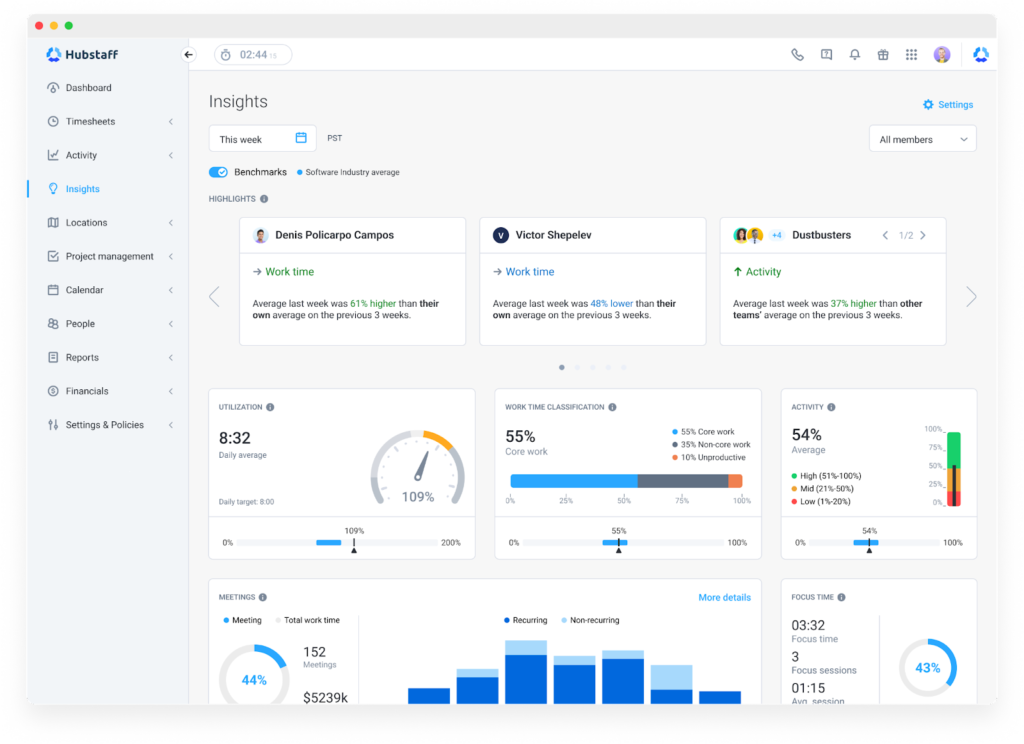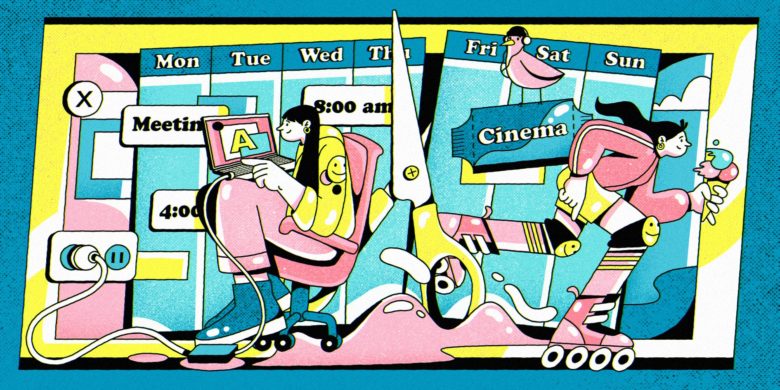While it may not appear on your to-do list, quarterly goals, or even your performance review, empathy in the workplace is one of the secret leadership skills that separates good and great managers.
Many of us have sympathy and compassion for those around us — and that’s a great first step that deserves to be lauded. However, empathy is about taking that next step and placing yourself in the person’s perspective. That often happens in two forms:
- Cognitive empathy. We all sympathize by thinking up ways we’d handle a situation, but how would others handle it? Cognitive empathy is about not only reading a scenario but also predicting how different leadership styles, personalities, cultural values, and experiences might lead others to approach the situation differently.
- Emotional Empathy. While cognitive empathy is about thinking like others, emotional empathy is about feeling like them. How will each of your employees react to negative criticism? How will they feel when they receive praise? Emotional empathy is about feeling from the point of view of others.
We’ve really jumped off the deep end here in the intro of the post, huh?
If you’re reading this and it seems like a lot more to add to your plate, that’s completely valid. But on the topic of validity, you can’t deny the importance of mastering empathy. 85% or more employees claim empathy makes them more productive, trusting, and confident in leadership.
With that statistic, we haven’t even begun to scratch the surface of how empathy benefits employees and employers alike. Let’s get started.
Boost your team’s efficiency with Hubstaff's productivity tools
Try it free for 14 daysBenefits of empathy for employees
For employees, empathetic leadership strikes a chord that helps them meet leadership on a human level. That’s probably why employees point to empathy as a critical contributor to boosting morale and fostering an inclusive work environment.

Employees who are satisfied in their roles are also more likely to be motivated. That’s not a matter of opinion either. Take it from Forbes:
- According to Forbes, “Team members with empathetic leaders are more motivated to come up with different and unique ideas, feel more connected to their work and to each other, and are more likely to want to stay with that employer.”
- 61% of employees felt more innovative under empathetic leadership compared to just 13% of those who were lacking.
- 86% of employees claimed they’re more successful balancing workloads and life concerns when they have an empathetic leader backing them. That’s 26% better than teams lacking that positive, empathetic influence.
Now that you’ve seen some statistics on the benefits of empathy for employees, let’s take a look at some key areas where empathetic leadership is impactful.
Reduction in workplace stress and conflict through empathetic communication and conflict resolution.
Stress and workplace conflict cost companies tens of billions per year. Fortunately, empathetic leadership has been known to reduce stress and burnout. When leaders look to utilize the right tools and strategies to promote empathy in the workplace, employees are:
- Less stressed. Empathetic leaders understand the importance of reducing stress in the workplace. This positively impacts employee morale, retention, and productivity.
- Less likely to be absent. Empathetic leadership has been proven to help reduce absenteeism by improving work-life balance, job satisfaction, and communication.
- More likely to be empathetic themselves. When taught empathic skills through leadership or mentorship programs, employees are more likely to spread this way of thinking, reducing costs associated with conflict resolution.
Improved relationships
“If your emotional abilities aren’t in hand, if you don’t have self-awareness, if you are not able to manage your distressing emotions, if you can’t have empathy and have effective relationships, then no matter how smart you are, you are not going to get very far.”
Daniel Goleman
Author, Psychologist
Emotional Intelligence: Why It Can Matter More Than IQ
Take it from Psychologist and Author Daniel Goleman: All the intelligence in the world means nothing if you lack the empathy to strengthen the relationships around you. Great leaders expand their abilities by using empathy to tap into the minds of the subject matter experts around them.
Enhanced communication
“Most people do not listen with the intent to understand; they listen with the intent to reply.”
Stephen R. Covey, Author
The 7 Habits of Highly Productive People
Now, that’s a quote we all (myself included) need to have burned into our minds. Beyond just being the objectively right thing to do, empathetic listening also has positive effects in that it helps you:
- Better retain information. We’re always hearing, but we aren’t always listening. When you listen only to respond, you spend more time thinking about your next point than really processing what others are saying. Listening to understand makes it easier to hold onto important information.
- Build trust. When managers listen to their employees about what’s ailing them in both personal and professional settings, it fosters a sense of trust. This trust then leads to increased productivity. If you’re not convinced, take it from literal neuroscientists who say so.
Increased employee engagement
“Never look down on someone, unless you’re helping them up.”
Jesse Jackson
Civil Rights Leader and Activist
While well-intentioned, sympathy can sometimes come off as condescending. Most people don’t want to be pitied, but they do want to be empathized with.
While you’re probably not vaulting your employees over the massive civil rights hurdles Jesse Jackson was alluding to in this quote, you can use your empathy to help elevate those around you. When you empathize with those you mentor, you help them meet you on your level, too. From there, there’s nowhere to go but up.
Higher job satisfaction
“Leadership is about empathy. It is about having the ability to relate to and connect with people for the purpose of inspiring and empowering their lives.”
Oprah Winfrey
“You get higher job satisfaction, you get higher job satisfaction, and you get higher job satisfaction…” All jokes aside, Oprah is spot on here. When you lead with empathy, you inspire and empower those around you. Empowered employees are more likely to find greater satisfaction in their jobs.
Increased innovation and creativity
“Creativity is seeing what others see and thinking what no one else ever thought.”
Albert Einstein
It comes as no surprise that the godfather of theoretical physics and one of the greatest thinkers of all time could so easily connect creativity and empathy. Creativity is about seeing the world through an array of different perspectives and arriving at a new conclusion. What better way to do that than to practice empathy?
If that’s too theoretical for you, here are some results you can’t really argue with. 87% of employees feel that empathetic companies are more creative.

Empathy and leadership: How to put it into practice
Now that you understand the importance of empathy in leadership, it’s time to take a look at some ways that you can create positive change in the workplace by prioritizing empathy.
Ways to increase empathy in the workplace
Lead by Example
The easiest part about spreading empathy as a leader is that you’re already in a position to influence and mentor others. By demonstrating empathy in your own interactions with employees, colleagues, and clients, you set a positive example for others to follow.
Provide Training and Development
Empathy comes easier to some than others. In much the same way we have an IQ, many psychologists believe in the concept of EQ for emotional intelligence. That said, you can improve EQ for you and your team with empathy training.
If you’re looking to improve empathy skills and scalability is feeling like a challenge, our friends at Udemy have a whole list of courses specifically catered to instilling empathy across your organization.
Encourage Open Communication
Create a culture of open communication where employees feel comfortable sharing their thoughts, feelings, and perspectives. Create a sense of psychological safety, stress the importance of DEIA initiatives, and encourage active listening to validate employees’ experiences and emotions by:
- Improving active listening
- Scheduling one-on-ones
- Providing outlets for employee feedback
- Prioritizing better work-life balance for your team
It’s easier to promote open communication with the right tools. At Hubstaff, we use our Daily Stand-up tool to help our global team give feedback on how their day went, what goals they accomplished, what roadblocks they encountered, and more. The best part? You can customize the questions to your team’s liking.
Promote Work-Life Balance
True empathy starts with viewing your employees as more than workers. When you learn about your employees as people and promote better work-life balance, you’ll see them have an easier time locking in at work.
Need some help balancing workloads and keeping tabs on employee mental health and well-being? Hubstaff Insights can help.
Promote Work-Life Balance with Insights

The best way to promote work-life balance and empathize with your team is by finding the right tools. With Hubstaff’s Insights add-on, you can gain a new sense of empathy for your team by exploring:
- Time spent in meetings vs. focus time
- Utilization rates
- Engagement scores
- Highlights to spot changes in efficiency that signify burnout
Leading with empathy
With the right tools and strategies, you can become an empathetic leader who employees want to work for each and every day. While practicing empathy might not have an immediate impact on your bottom line, it has lasting effects that spread throughout your organization like:
- Improved relationships
- Better communication
- Increased engagement
- Higher job satisfaction
- Heightened creativity
When you use empathy to improve in these core areas, you’ll soon see how the emotional and cognitive shift stimulates productivity, improves retention, and generates new avenues for employees to help your business improve their bottom line.
Most popular
How to Calculate a Raise: Practical Guide for Employers
By 2030, the US alone will lose $430 billion annually due to low talent retention — and a lot of this turnover stems from low pa...
How to Survive and Thrive in an 80-Hour Work Week
It’s hard to believe that only a century ago, the 80-hour work week was the norm in the United States. Then, in 1926, the Ford M...
Mastering Workforce Scheduling: Techniques and Tools for Success
Imagine a workday where scheduling your workforce effectively ensures that every shift is perfectly aligned with your business nee...
Top Time Trackers for Virtual Assistants: Enhance Efficiency and Accountability
Virtual assistants (VAs) have a lot of responsibilities — and so do the people who hire them. With so much to keep track of, a t...




